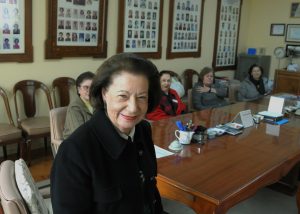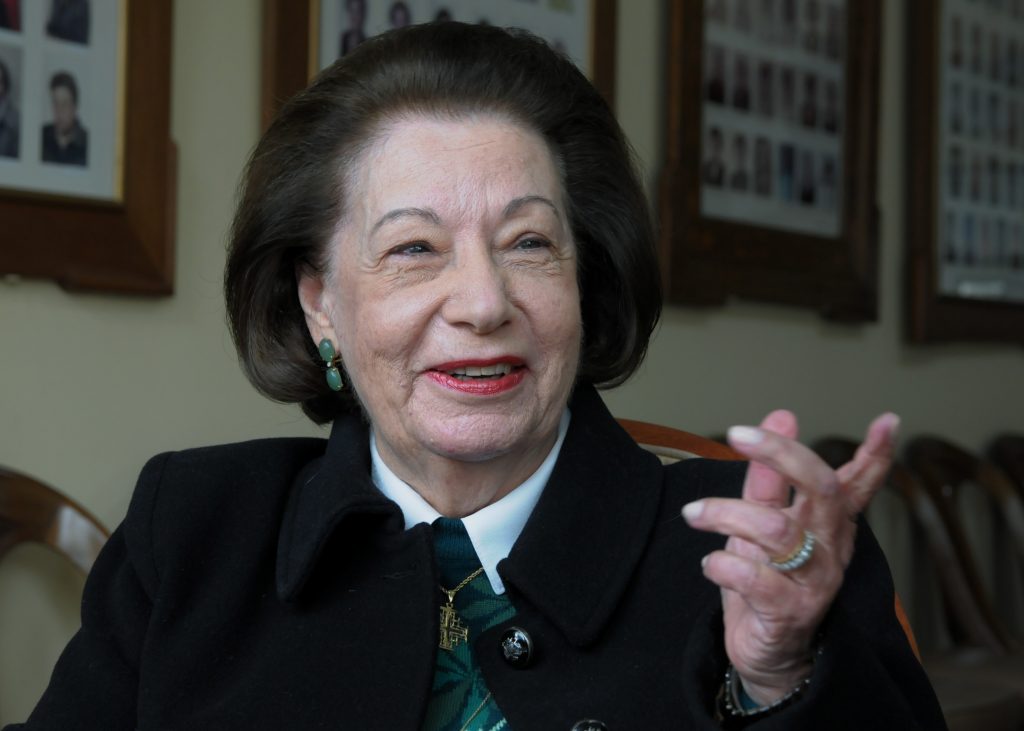My grandparents were from Syria and Lebanon and came to Brazil at the time of the First World War. My grandfather from my dad’s side, Camasmie, came from Homs, Syria, and my grandfather from my mom’s side, came from Zahlé, Lebanon. My grandfather Badra went to Santa Cruz das Palmeiras, 253 km from São Paulo, sold goods door to door, opened a store, became a farmer. My grandfather Camasmie was a teacher, but since he couldn’t speak Portuguese when he arrived in Brazil, he also went selling goods door to door. Later, he opened a small-articles store at March 25th Street.
My father, Demétrio Taufik Camasmie, also made a career in retail. He met my mother, who’s always been very pretty, and was enchanted. They had four children, me, two sisters and a brother. I was born in 1938, in São Paulo, shortly before the Second World War. My father’s family spoke a lot of Arabic at home, but due to the war they didn’t want to pass it along to the children. For this reason, I don’t speak Arabic. But the Arab cuisine is very much present in our home.

My mom was a Catholic from the Melkite Church (Melkite Greek Catholic Church), but she used to attend the Catholic Church (Roman Catholic Church). I studied in a Catholic school, the Sacré-Coeur de Marie. Later, I studied Pedagogy, with a specialization in Psychology at the Sedes Sapientiae Institute. I only concluded my studies when my children were raised. I returned to school and finished my course at the Catholic Pontifical University (PUC). I majored in Pedagogy with a focus on School Management, which gave me a strong basis for my work at Mão Branca.
Mão Branca was founded at the social hall of the Antiochian Orthodox Church in São Paulo. A group of women gathered and distributed food, medicine and cared for the less fortunate elderly. Until one day an elderly man didn’t show up for the food. They went to visit him and he was dead. The beginning of Mão Branca was like that, in 1912. In the 1940s, a property of ten thousand square meters in Santo Amaro was bought and the headquarters was built with donations from the local community where it’s located today. All the pavilions were donated and carry the name of the donor families.
At this time, at 42 years old, I began to work as a volunteer at Mão Branca. The group that joined in with me changed the overall features of the organization a great deal. We formed a good and tight working group. The elderly were always very well-cared for at Mão Branca, but something was missing!

My mom was Catholic from the Melkite Church (Melkite Greek Catholic Church), but she used to attend the Catholic Church (Roman Catholic Church). I studied in a Catholic school, the Sacré-Coeur de Marie. Later, I studied Pedagogy, with a specialization in Psychology at the Sedes Sapientiae Institute. I only concluded my studies when my children were raised. I returned to school and finished my course at the Catholic Pontifical University (PUC). I majored in Pedagogy with a focus on School Management, which gave me a strong basis for my work at Mão Branca.
Mão Branca was founded at the social hall of the Antiochian Orthodox Church in São Paulo. A group of women gathered and distributed food, medicine and cared for the less fortunate elderly. Until one day an elderly man didn’t show up for the food. They went to visit him and he was dead. The beginning of Mão Branca was like that, in 1912. In the 1940s, a property of ten thousand square meters in Santo Amaro was bought and the headquarters was built with donations from the local community where it’s located today. All the pavilions were donated and carry the name of the donor families.
At this time, at 42 years old, I began to work as a volunteer at Mão Branca. The group that joined in with me changed the overall features of the organization a great deal. We formed a good and tight working group. The elderly were always very well-cared for at Mão Branca, but something was missing!

Today, the centers are an arm of Mão Branca. The Capão Redondo center was closed, but we have other four centers: Jardim Ângela, M’Boi Mirim, Campo LImpo and Brás, all operating inside Catholic churches. Many people that were dispirited at home began to live again with this moment of leisure. Everyone needs entertainment. We have over 400 elderly people in these centers in the suburbs. We also visit the elderly that are confined to their bed, bringing medicine and whatever they need.
At Mão Branca we have the ILPI (Long-term Institution), which is the services offered to the residents, those living at Mão Branca. Two years ago, we also created the Day Center (NCI), in which the elderly spend their days at Mão Branca and go home to sleep with the family. And we have these living centers that offer leisure time, dancing, physical activity, handmade of costume jewelry and other activities.
We have had great donors, all of the pavilions at headquarters, in Santo Amaro, were built with donations, but today it’s getting harder and harder. There isn’t in Brazil a donation culture, especially to the elderly, it’s hard to make people and companies aware of how important their donations are. Old age is very hard. I say this from experience, our body deteriorates. We need a lot of resources, since living expenses almost doubles when one gets old.
Mão Branca welcomes everyone with excellence, we have doctors, nurses, nursing assistant, caregivers, nutritionists, physical therapist, occupational therapist, all types of professionals needed.
If I know the Arab countries? Yes, I went to Egypt with my husband, since I had studied Egyptian history and really wanted to know it personally. Later, we went to Damascus and Homs, in Syria, and to Zahlé, Beirut, and the city of my husband’s parents, in Lebanon. It was emotional to get to know the place in which my grandparents were born. What have I inherited from the Arabs? Tough question, I don’t know exactly (…) but I think it was the generosity.
Translated by Sérgio Kakitani




